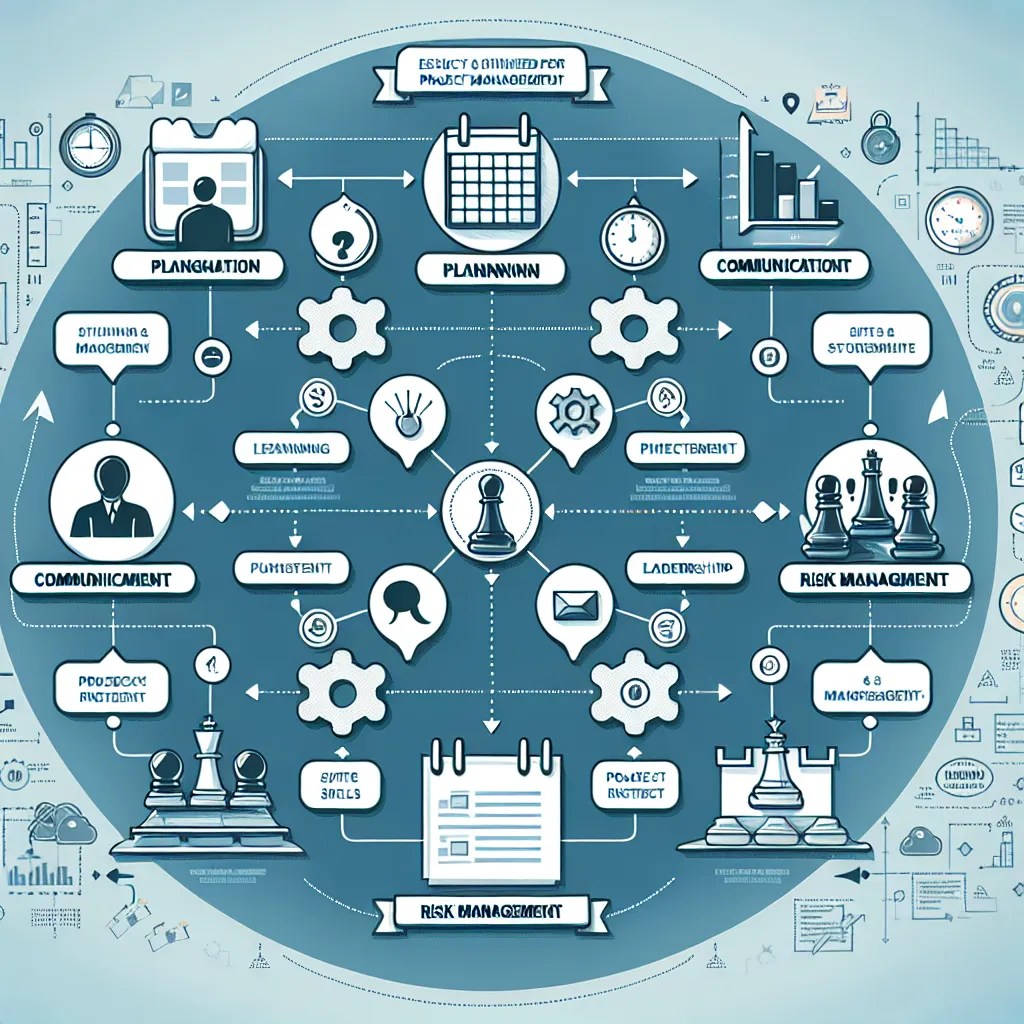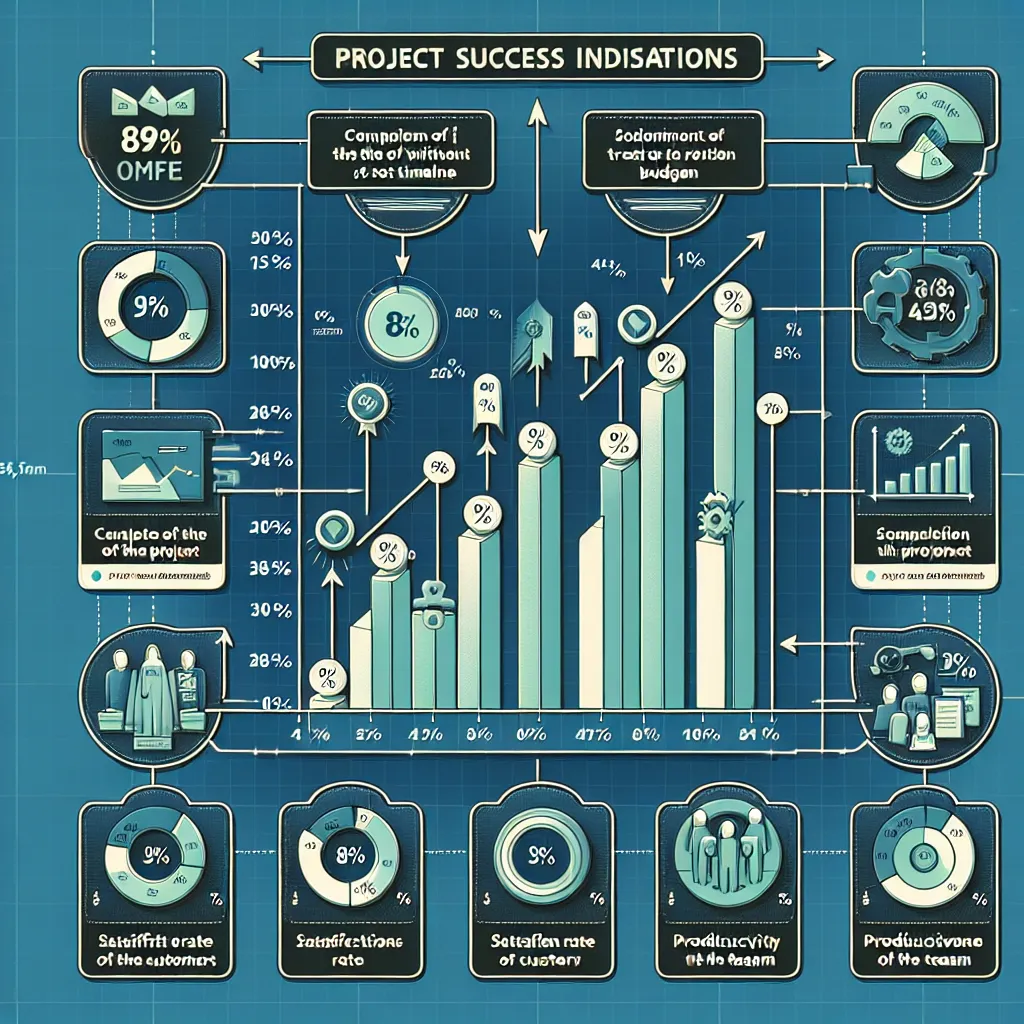Project management experience is a valuable asset in many industries, and being able to effectively communicate this experience during an English interview is crucial. Whether you’re applying for a project manager position or any role that involves project-related responsibilities, articulating your project management skills can set you apart from other candidates. This article will guide you through the process of discussing your project management experience in English interviews, providing you with strategies, examples, and tips to make a lasting impression on your potential employers.
Understanding the Importance of Project Management Experience
Project management experience is highly valued by employers across various sectors. It demonstrates your ability to plan, execute, and complete tasks efficiently while managing resources and team members. When discussing your project management experience in an interview, you’re showcasing your organizational skills, leadership capabilities, and problem-solving aptitude.
 Project Management Skills
Project Management Skills
How Interviewers Assess Project Management Experience
When evaluating your project management experience, interviewers typically focus on several key areas:
- Planning and organization skills
- Leadership and team management abilities
- Communication proficiency
- Problem-solving and decision-making capabilities
- Adaptability and flexibility
- Results and achievements
Understanding these assessment criteria will help you prepare more effectively for your interview.
Strategies for Discussing Your Project Management Experience
1. Use the STAR Method
The STAR (Situation, Task, Action, Result) method is an excellent framework for structuring your responses about project management experience:
- Situation: Describe the context of the project
- Task: Explain your specific responsibilities
- Action: Detail the steps you took to manage the project
- Result: Highlight the outcomes and your achievements
Example:
“In my previous role, I was tasked with implementing a new CRM system for our sales team (Situation). As the project manager, I was responsible for coordinating between our IT department and the sales team, ensuring the system met our needs and was delivered on time and within budget (Task). I created a detailed project plan, conducted regular meetings with stakeholders, and managed potential risks (Action). As a result, we successfully launched the system two weeks ahead of schedule, which led to a 20% increase in sales productivity within the first quarter (Result).”
2. Highlight Specific Skills and Tools
When discussing your project management experience, mention specific skills and tools you’ve used:
- Project management methodologies (e.g., Agile, Scrum, Waterfall)
- Software and tools (e.g., Microsoft Project, Jira, Trello)
- Budget management
- Risk assessment and mitigation
- Stakeholder communication
Example:
“I have extensive experience using Agile methodologies, particularly Scrum. In my last project, I utilized Jira for task tracking and conducted daily stand-ups to ensure seamless communication among team members.”
3. Quantify Your Achievements
Whenever possible, use numbers and metrics to quantify your project management successes:
- Project completion time
- Budget savings
- Productivity improvements
- Team size
- Return on investment (ROI)
Example:
“By implementing a new project management tool and streamlining our processes, I was able to reduce project completion times by 30% and increase team productivity by 25%.”
 Project Success Metrics
Project Success Metrics
4. Discuss Challenges and Solutions
Interviewers are often interested in how you handle challenges. Be prepared to discuss difficult situations you’ve encountered and how you resolved them:
Example:
“During a critical project, we faced unexpected budget cuts. I immediately reassessed our priorities, reallocated resources, and negotiated with vendors for better rates. Through these actions, we were able to complete the project successfully without compromising on quality.”
5. Emphasize Soft Skills
Project management isn’t just about technical skills. Highlight your soft skills such as:
- Leadership
- Communication
- Conflict resolution
- Adaptability
- Time management
Example:
“In my role as a project manager, I’ve found that clear communication is key. I make it a priority to ensure all team members and stakeholders are kept informed through regular updates and meetings.”
Common Interview Questions and Sample Answers
Here are some typical project management-related questions you might encounter in an English interview, along with sample answers:
-
Q: “Can you describe a challenging project you managed and how you ensured its success?”
A: “One particularly challenging project was the implementation of a new enterprise resource planning (ERP) system across our organization. The main challenges were the tight deadline, limited budget, and resistance to change from some departments. To ensure success, I first created a detailed project plan with clear milestones and contingencies. I then formed a cross-functional team, including representatives from each department, to address concerns and gather input. We implemented a comprehensive change management strategy, which included regular training sessions and open forums for feedback. Despite initial setbacks, we completed the project on time and under budget. The new system improved overall efficiency by 40% within six months of implementation.” -
Q: “How do you prioritize tasks in a project with competing deadlines?”
A: “When faced with competing deadlines, I use a combination of urgency and importance to prioritize tasks. I start by creating a matrix that categorizes tasks based on their impact on the project and time sensitivity. For critical path items, I ensure they receive immediate attention. I also communicate clearly with stakeholders about priorities and potential trade-offs. If necessary, I negotiate deadline extensions for less critical tasks or allocate additional resources to high-priority items. This approach has helped me manage multiple projects simultaneously without compromising on quality or missing crucial deadlines.” -
Q: “How do you handle conflicts within a project team?”
A: “Conflict management is a crucial skill in project management. When conflicts arise, I first try to understand the root cause by listening to all parties involved. I then facilitate a discussion to find common ground and potential solutions. If needed, I use conflict resolution techniques such as compromise or collaboration. In one instance, two team members had different approaches to a technical solution. I organized a workshop where both could present their ideas, and we collectively evaluated the pros and cons. This not only resolved the conflict but also led to an innovative hybrid solution that benefited the project.” -
Q: “How do you ensure effective communication among project stakeholders?”
A: “Effective communication is the backbone of successful project management. I establish a communication plan at the project’s outset, defining frequency, methods, and recipients of project updates. I use a mix of regular status meetings, written reports, and collaborative tools like Slack or Microsoft Teams. For key stakeholders, I schedule one-on-one meetings to address specific concerns. I also believe in transparency, sharing both successes and challenges, which builds trust and encourages open dialogue. This approach has consistently led to better stakeholder engagement and project outcomes.” -
Q: “Can you give an example of how you’ve managed project risks?”
A: “Risk management is an ongoing process throughout a project’s lifecycle. In a recent software development project, I implemented a proactive risk management strategy. We started with a comprehensive risk assessment during the planning phase, identifying potential issues like technical challenges, resource constraints, and external dependencies. I created a risk register and assigned risk owners for each identified risk. We regularly reviewed and updated the register in our weekly team meetings. When a major vendor delayed delivery of a critical component, we were prepared with a contingency plan that involved using an alternative supplier, which we quickly implemented. This approach minimized the impact on our project timeline and budget.”
Tips for Handling Unexpected Questions
Sometimes, you may encounter questions about project management aspects you’re not familiar with. Here are some tips to handle such situations:
-
Stay calm and composed: Take a deep breath and remember that it’s okay not to know everything.
-
Be honest: If you’re not familiar with a specific concept or tool, admit it politely. For example, “I haven’t had direct experience with that particular methodology, but I’m always eager to learn new approaches.”
-
Draw parallels: Try to relate the question to something you do know. For instance, if asked about a project management tool you haven’t used, you could say, “While I haven’t used that specific tool, I have experience with similar software like [mention a tool you know], which also focuses on task tracking and team collaboration.”
-
Show willingness to learn: Express your interest in learning about the topic. For example, “That’s an interesting aspect of project management I haven’t encountered yet. Could you tell me more about how it’s applied in your organization? I’m always looking to expand my knowledge in this field.”
-
Redirect to your strengths: After acknowledging your unfamiliarity, steer the conversation towards your relevant strengths. For instance, “While I’m not familiar with that specific technique, I have successfully managed complex projects using [mention your approach], which has consistently delivered results.”
Common Mistakes to Avoid When Discussing Project Management Experience
When talking about your project management experience in English interviews, be aware of these common pitfalls:
-
Overemphasizing technical details: While technical knowledge is important, don’t get bogged down in jargon or overly specific details. Focus on your overall approach and results.
-
Neglecting to mention teamwork: Project management is about leading teams. Ensure you highlight your ability to work with and motivate others.
-
Failing to provide concrete examples: Avoid vague statements. Always back up your claims with specific examples from your experience.
-
Taking full credit: Remember to acknowledge your team’s contributions. Use “we” when discussing team achievements and “I” when highlighting your specific actions.
-
Ignoring lessons learned: Don’t shy away from discussing challenges or failures. Emphasize what you learned and how you’ve applied those lessons.
-
Lack of preparation: Not being ready with specific examples and metrics can make your responses seem vague and unconvincing.
-
Poor time management in responses: Practice giving concise yet comprehensive answers to avoid rambling or providing too little information.
To avoid these mistakes, prepare thoroughly before your interview. Practice articulating your experiences clearly and concisely, focusing on your key achievements and the value you brought to each project.
Follow-up Questions and Suggested Answers
Here are additional follow-up questions you might encounter, along with suggested answers:
-
Q: “How do you handle scope creep in a project?”
A: “To manage scope creep, I establish a clear project scope at the outset and implement a formal change control process. Any proposed changes are evaluated for their impact on timeline, budget, and resources. I communicate these implications to stakeholders and only approve changes that align with project goals and have necessary resources allocated.” -
Q: “What’s your approach to resource allocation in a project?”
A: “I start by creating a detailed resource plan based on the project requirements. I consider team members’ skills, availability, and workload. I use resource management tools to track allocations and make adjustments as needed. Regular check-ins with team members help me identify any resource constraints early on.” -
Q: “How do you ensure project quality?”
A: “Quality assurance is integrated throughout the project lifecycle. I establish clear quality standards at the beginning, implement regular quality checks, and encourage a culture of continuous improvement. I also use tools like checklists and peer reviews to maintain consistency and catch issues early.” -
Q: “Can you describe your experience with Agile project management?”
A: “I’ve managed several projects using Agile methodologies, particularly Scrum. This involved leading daily stand-ups, sprint planning, and retrospectives. I find Agile particularly effective for projects that require flexibility and frequent stakeholder feedback.” -
Q: “How do you keep a project on track when facing delays?”
A: “When facing delays, I first assess the impact on the overall project timeline. I then look for opportunities to fast-track other tasks or reallocate resources. I communicate transparently with stakeholders about the delay and present a revised plan. If necessary, I negotiate for additional resources or adjusted deadlines.” -
Q: “What tools do you use for project scheduling and tracking?”
A: “I’m proficient in several project management tools. I frequently use Microsoft Project for detailed scheduling and Gantt charts. For collaborative task tracking, I’ve had success with tools like Jira and Trello. I also use Excel for budget tracking and creating custom reports.” -
Q: “How do you motivate team members during long or challenging projects?”
A: “Motivation is key to project success. I focus on clear communication of project goals and how each member’s work contributes to these goals. I recognize and celebrate milestones and individual contributions. For challenging projects, I ensure regular check-ins to address concerns and provide support where needed.” -
Q: “Can you give an example of a time when you had to make a difficult decision in a project?”
A: “In a recent project, we faced a critical bug just before launch. I had to decide whether to delay the launch or release with a known issue. After assessing the impact and consulting with key stakeholders, I decided to delay the launch by one week. This allowed us to fix the bug and ultimately resulted in a more successful product release and higher customer satisfaction.”
In conclusion, effectively communicating your project management experience in English interviews requires preparation, practice, and a structured approach. By using the STAR method, highlighting specific skills and achievements, and being prepared for common questions, you can showcase your expertise confidently. Remember to provide concrete examples, quantify your successes, and demonstrate your ability to lead teams and solve problems. With these strategies, you’ll be well-equipped to impress interviewers and demonstrate why you’re the ideal candidate for project management roles.
For more insights on acing your English interviews, check out our related articles on how to discuss your experience in leadership roles and how to explain your approach to problem-solving in English.




